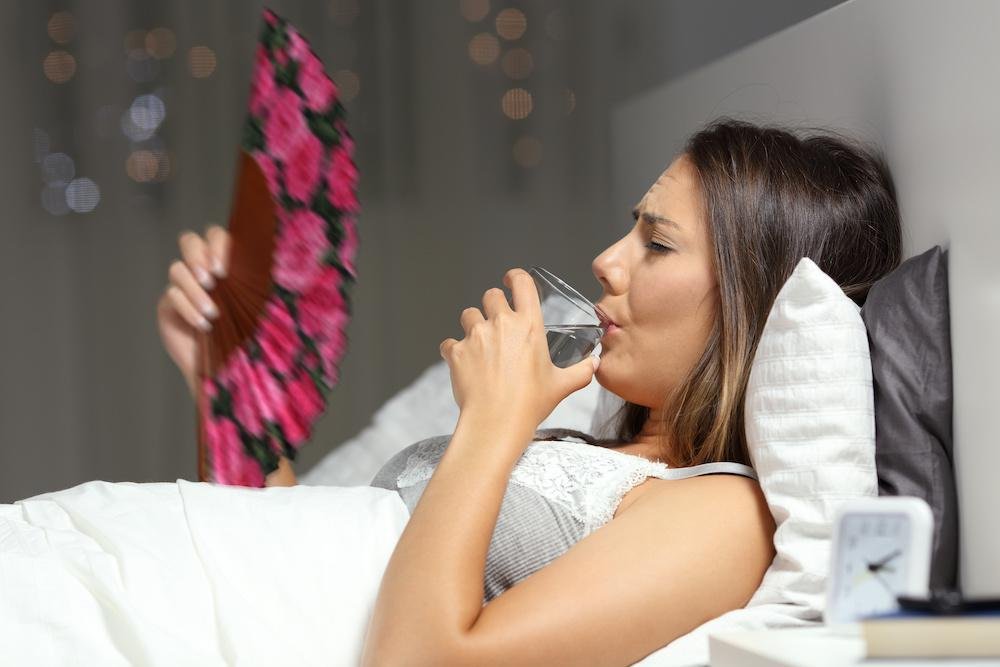Night sweats, characterized by excessive perspiration during sleep, can disrupt your peaceful slumber and leave you feeling fatigued and uncomfortable. While there can be various causes for night sweats, including medical conditions and hormonal changes, natural remedies can often provide relief without resorting to medications with potential side effects. In this blog, we’ll explore a range of natural remedies that may help you manage and reduce night sweats, allowing you to enjoy a more restful sleep.
Contents
- 1 What Does “Night Sweats in Menopause” Mean?
- 2 Natural Remedies for Night Sweats
- 2.1 Sage Tea
- 2.2 Cool Sleeping Environment
- 2.3 Flaxseed
- 2.4 Chamomile Tea
- 2.5 Regular Exercise
- 2.6 Hydration
- 2.7 Vitamin E
- 2.8 Aromatherapy
- 2.9 Mind-Body Techniques
- 2.10 Acupuncture
- 2.11 Limit Caffeine and Alcohol
- 2.12 Yoga for Hormonal Balance
- 2.13 Evening Primrose Oil
- 2.14 Dress in Layers
- 2.15 Mindful Breathing Before Bed
- 2.16 Maintain a Consistent Sleep Schedule
- 2.17 Stay Cool During the Day
- 2.18 Maintain a Healthy Weight
- 2.19 Nettle Tea
- 2.20 Peppermint Oil Foot Soak
- 3 Conclusion
What Does “Night Sweats in Menopause” Mean?

Night sweats in menopause refer to episodes of excessive sweating that occur during the night and are associated with hormonal changes during the menopausal transition. Menopause is a natural biological process that marks the end of a woman’s reproductive years. It typically occurs in the late 40s or early 50s, and during this time, the ovaries gradually produce fewer hormones, including estrogen and progesterone.
Night sweats are a common symptom experienced by many women during menopause, and they are often linked to hormonal fluctuations. The decline in estrogen levels can impact the body’s thermoregulatory system, leading to temperature dysregulation and, subsequently, night sweats. These episodes of sweating can range from mild to severe and may be accompanied by a rapid heartbeat or a feeling of intense warmth.
Key points about night sweats in menopause include:
- Hormonal Changes: The primary cause of night sweats during menopause is the decline in estrogen levels. Estrogen plays a role in regulating body temperature, and when its levels drop, the body may have difficulty maintaining a stable temperature, leading to sudden bouts of sweating.
- Frequency and Severity: Night sweats can vary in frequency and severity among women experiencing menopause. Some may have occasional and mild episodes, while others may experience frequent and intense sweats that disrupt sleep.
Natural Remedies for Night Sweats
If you’re seeking natural remedies to alleviate night sweats, consider incorporating the following into your routine:
Sage Tea
Sage tea is renowned for its potential to alleviate night sweats, particularly in menopausal women. The herb contains compounds that may help regulate hormonal imbalances, reducing the frequency and intensity of hot flashes and night sweats. To prepare sage tea, steep a teaspoon of dried sage leaves in hot water for about 10 minutes. Enjoying a cup before bedtime can contribute to more restful sleep by addressing hormonal fluctuations associated with night sweats.
Cool Sleeping Environment
Creating a cool sleeping environment is crucial for managing night sweats. Adjust the thermostat to a comfortable temperature, use lightweight and breathable bedding, and consider a fan to enhance air circulation. Additionally, moisture-wicking sheets and pillowcases can help absorb excess sweat, promoting a drier and more comfortable sleep atmosphere.
Flaxseed
Ground flaxseed is rich in lignans, compounds with mild estrogenic properties that may help balance hormonal fluctuations contributing to night sweats. Incorporating flaxseed into your diet, whether by adding it to yogurt, smoothies, or cereal, can be a natural and nutritious way to address hormonal imbalances associated with menopause and reduce the severity of night sweats.
Chamomile Tea
Chamomile tea is well-known for its calming and soothing properties. Consuming a cup of chamomile tea before bedtime may help relax the nervous system, potentially reducing stress and anxiety that can contribute to night sweats. The gentle aroma and mild sedative effects make chamomile an excellent choice for promoting relaxation and a better night’s sleep.
Regular Exercise

Engaging in regular physical activity is a natural way to regulate hormones and reduce the frequency of night sweats. Exercise promotes overall health, helps balance mood, and regulates body temperature. Aim for at least 30 minutes of moderate exercise most days of the week, such as brisk walking, cycling, or swimming, to enjoy the benefits of improved sleep and hormonal balance.
Hydration
Staying well-hydrated is essential for overall health and can help manage night sweats. Dehydration can exacerbate symptoms, so make a conscious effort to drink an adequate amount of water throughout the day. While it’s crucial to stay hydrated, avoid consuming large amounts of fluids close to bedtime to minimize the risk of waking up with a full bladder.
Vitamin E
Vitamin E is known for its antioxidant properties and may have a mild impact on reducing the severity of night sweats. Including vitamin E-rich foods in your diet, such as almonds, sunflower seeds, and spinach, or consulting with a healthcare professional about vitamin E supplements, maybe a natural approach to managing symptoms associated with hormonal changes.
Aromatherapy
Essential oils like lavender and peppermint used in aromatherapy can create a calming and relaxing atmosphere in your bedroom. Incorporating a few drops of these oils into a diffuser or applying them to your pillow can contribute to stress reduction, potentially decreasing the likelihood of night sweats and promoting a more peaceful sleep.
Mind-Body Techniques
Practices like meditation and deep breathing exercises can be effective in managing stress and anxiety, common triggers for night sweats. By incorporating mindfulness into your daily routine, you may experience improved sleep quality and a reduction in the frequency of night sweats. Set aside time for relaxation techniques before bedtime to help signal to your body that it’s time to unwind.
Acupuncture
Acupuncture, a traditional Chinese medicine technique involving the insertion of thin needles into specific points on the body, has been explored as a natural remedy for night sweats. Some individuals find relief from hormonal imbalances and associated symptoms through acupuncture sessions. Consult with a qualified practitioner to discuss whether acupuncture may be a suitable and beneficial option for managing night sweats naturally.
Limit Caffeine and Alcohol
Caffeine and alcohol can contribute to dehydration and disrupt sleep patterns. Both substances may trigger night sweats, so it’s advisable to limit their consumption, especially in the hours leading up to bedtime. Opt for herbal teas or water as alternatives to promote hydration without the stimulating effects of caffeine or the potential sleep disturbances caused by alcohol.
Yoga for Hormonal Balance

Yoga is a holistic practice that combines physical postures, breath control, and meditation. Specific yoga poses, such as forward bends and inversions may help regulate hormonal fluctuations associated with menopause, potentially reducing the occurrence of night sweats. Including yoga in your routine can contribute to overall well-being and hormonal balance.
Evening Primrose Oil
Evening primrose oil is a supplement derived from the evening primrose plant, known for its high content of gamma-linolenic acid (GLA). Some women use evening primrose oil to alleviate symptoms of menopause, including night sweats. However, it’s crucial to consult with a healthcare professional before incorporating supplements to determine the appropriate dosage and ensure safety.
Dress in Layers
Dressing in layers allows for better temperature regulation, especially if you are prone to night sweats. Choose breathable and moisture-wicking fabrics for your sleepwear, making it easier for your body to dissipate heat. This way, you can adjust your clothing throughout the night to maintain a comfortable temperature and minimize the risk of waking up soaked in sweat.
Mindful Breathing Before Bed
Practicing mindful breathing exercises before bedtime can help calm the nervous system and reduce stress, potentially preventing night sweats. Focus on deep, slow breaths, inhaling through your nose and exhaling through your mouth. This simple yet effective technique can be incorporated into your bedtime routine to promote relaxation and improve sleep quality.
Maintain a Consistent Sleep Schedule
Keeping a consistent sleep schedule helps regulate your body’s internal clock, making it easier to fall asleep and stay asleep. Aim to go to bed and wake up at the same time every day, even on weekends. This regularity reinforces your natural circadian rhythm, potentially reducing the likelihood of night sweats and promoting a more stable sleep pattern.
Stay Cool During the Day
Implementing strategies to stay cool during the day can contribute to minimizing night sweats. Avoid hot environments, and if possible, take breaks in air-conditioned spaces. Wear lightweight, breathable clothing, and consider using cooling products, such as cooling towels or fans, to manage body temperature and reduce the risk of nighttime sweating.
Maintain a Healthy Weight
Maintaining a healthy weight through a balanced diet and regular exercise can positively impact hormonal balance and reduce the severity of night sweats. Excess body weight, especially around the midsection, may contribute to hormonal imbalances, so adopting a healthy lifestyle can be a natural and holistic approach to managing symptoms.
Nettle Tea
Nettle tea is an herbal remedy that some people find helpful in alleviating menopausal symptoms, including night sweats. Rich in vitamins and minerals, nettle tea is known for its potential to support hormonal balance. Steep a teaspoon of dried nettle leaves in hot water for a refreshing and potentially beneficial beverage before bedtime.
Peppermint Oil Foot Soak
Peppermint oil has cooling properties that can provide relief from overheating. Consider adding a few drops of peppermint oil to a foot soak before bedtime. This not only promotes relaxation but also helps cool the body, potentially reducing the occurrence of night sweats.
Conclusion
Night sweats can be disruptive and affect the quality of your sleep, but incorporating these natural remedies into your routine may provide relief. Remember that individual responses can vary, and it’s essential to consult with a healthcare professional if night sweats persist or are accompanied by other concerning symptoms.
By making lifestyle adjustments, adopting healthy habits, and exploring natural remedies, you can work towards achieving a more restful and sweat-free night’s sleep.
If you are facing menopause-related issues, menopause treatment at HerMantra can help. Book your free trial online menopause treatment session now.


